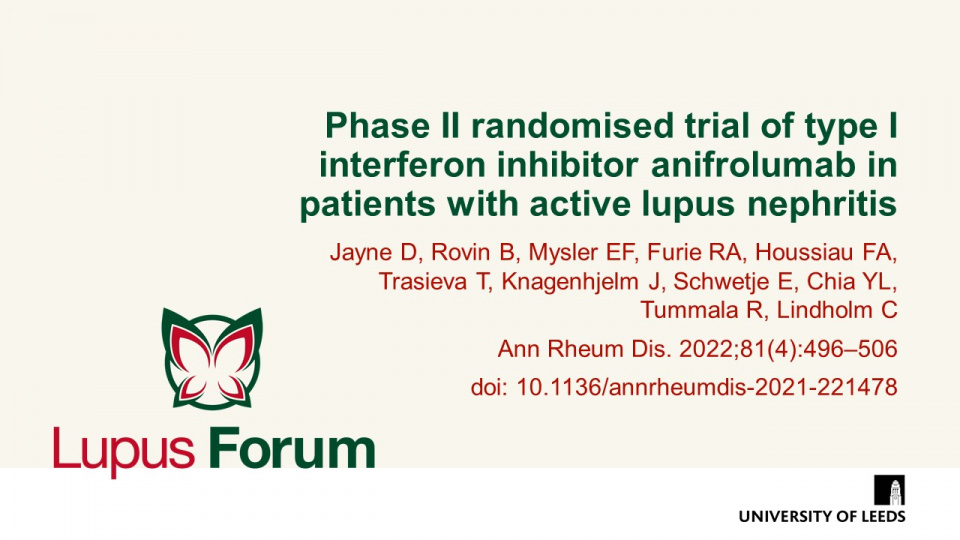Publications
Find coverage of the latest original articles on Lupus, focusing on those with data on therapeutic interventions and those that have clinical impact.
SGLT2 Inhibitors Alleviated Podocyte Damage in Lupus Nephritis by Decreasing Inflammation and Enhancing Autophagy
Ann Rheum Dis. 2023 DOI: 10.1136/ard-2023-224242
Data revealed a renoprotective effect of SGLT2 inhibitors by reducing proteinuria and preserving renal function in the murine MRL/lpr lupus model.
Safety and Efficacy of Long-term Voclosporin Treatment for Lupus Nephritis in the Phase 3 AURORA 2 Clinical Trial
Arthritis Rheumatol. 2023;76(1):59–67 DOI: 10.1002/art.42657
AURORA 2 demonstrated the safety and tolerability of continued administration of voclosporin over 3 years of treatment in patients with LN.
Keywords:
Risk and Factors Associated with Disease Manifestations in Systemic Lupus Erythematosus - Lupus Nephritis (RIFLE-LN): A Ten-year Risk Prediction Strategy Derived from a Cohort of 1652 Patients
Front Immunol. 2023 14:1200732 DOI: 10.3389/fimmu.2023.1200732
Using data from a longitudinal cohort of SLE patients of Chinese origin, the authors identified risk factors for LN and developed a prediction model, RIFLE-LN, which demonstrated good performance in a testing cohort of 270 patients.
Update on the Efficacy and Safety Profile of Voclosporin: An Integrated Analysis of Clinical Trials in Lupus Nephritis
Arthritis Care Res (Hoboken). 2023 Jul;75(7):1399–1408 DOI: 10.1002/acr.25007
Pooled analysis of data from the AURA-LV phase 2 and AURORA 1 phase 3 trials of voclosporin in patients with active LN demonstrated that significantly more patients achieved a complete renal response at 1 year in the voclosporin than the control group (p<0.0001), with no observation of new safety signals.
Clinical and biomarker responses to BI 655064, an antagonistic anti-CD40 antibody, in patients with active lupus nephritis: a randomized, double-blind, placebo-controlled, phase II trial
Arthritis Rheumatol. 2023;75(11):1983–93 doi: 10.1002/art.42557.
This phase II study of BI 655064 in patients with active LN did not meet the primary endpoint of CRR at Week 52, however, post-hoc analyses suggest a potential benefit of BI 655064 180 mg in patients with active LN.
Belimumab and antimalarials combined against renal flares in patients treated for extra-renal systemic lupus erythematosus: results from 4 phase III clinical trials
Rheumatology (Oxford) 2023;63(2):338–48 doi: 10.1093/rheumatology/kead253
The protection conferred from belimumab against renal flare development in patients treated for extra-renal SLE appears enhanced when administered along with antimalarials (AMA).
Remission of Lupus Nephritis: The Trajectory of Histological Response in Successfully Treated Patients
Lupus Sci Med. 2023;10(1):e000932 doi: 10.1136/lupus-2023-000932
LN histological activity takes months to years to resolve, providing a rationale for the need of long-term, well-tolerated maintenance immunosuppression.
Safety and Efficacy of Belimumab in Patients with Lupus Nephritis
Clin J Am Soc Nephrol. 2022;17:1620–1630 doi: 10.2215/CJN.02520322
This 28-week, open-label extension of BLISS-LN found no new safety signals and maintained efficacy with belimumab, in patients with lupus nephritis.
Keywords:
Long-Term Results of Triple Immunosuppression With Tacrolimus Added to Mycophenolate and Corticosteroids in the Treatment of Lupus Nephritis
Kidney Int Rep. 2021;7(3):516–25
Analysis of 22 patients with lupus nephritis (LN) demonstrates that triple immunosuppression with the addition of tacrolimus to mycophenolate and prednisolone results in further proteinuria reduction.
Phase II randomised trial of type I interferon inhibitor anifrolumab in patients with active lupus nephritis
Ann Rheum Dis. 2022;81(4):496–506 doi: 10.1136/annrheumdis-2021-221478
Despite not meeting the primary endpoint, this Phase II trial of anifrolumab in patients with active lupus nephritis (LN) demonstrates that anifrolumab IR is associated with numerical improvements over placebo across endpoints – including complete renal response – in patients with active LN.











